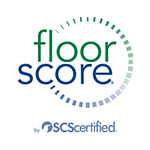Whether it’s three, five, or even 10 seconds, since the early days on the playground, almost everyone knows if you drop a piece of food, there is a brief grace period of being able to pick it up and (possibly) eat it. While that some-odd-second rule may have just been a childhood myth, that might not be the case anymore. New floor trends that are on the rise include the terms “antimicrobial” and “antibacterial.” With how these floor types are created and their respective “anti-“ abilities, that some-odd-second rule may have just been extended to even longer.
Before you rush out to one of your local CDC Distributors locations to drop every bread crumb you have, know this: not every type of floor currently available is antimicrobial and/or antibacterial. While these terms are popping up more and more recently in flooring choices, it’s only a select few floor types that have earned these monikers in 2015. So what do these “anti-“ powers entail?
For starters, you can put away your Bath & Body Works antibacterial hand sanitizer, because these floor types don’t need that type of protection, as it’s already built in. Other flooring choices that fall under this category can have a protective coating applied to the floor, but that does cover only a select few options. One choice that is leading the way as both an antimicrobial and an antibacterial floor is none other than cork, as this floor naturally contains a waxy surface. That surface, called suberin, repels insects, bacteria, vermin, microbes, and other germs that could be residing on a busy floor’s surface. But they won’t on cork!
Another flooring type you’ll see while browsing this advancing category is ceramic tile (which makes perfect sense as to why ceramic tile is frequently used in bathrooms and sometimes kitchens). In general, the natural, hard surface of ceramic tiles don’t harbor any germs or other allergens that can get trapped in other floor varieties. (Asthma sufferers rejoice!) But, depending on what brand of ceramic tile you purchase, some have even been created with ways to jump-start the antibacterial process, such as using sunlight to activate a chemical on ceramic tiles’ surfaces to oxidize germs, or the high temperature at which the tiles have been produced can help get rid of these pollutants.
While there still may be a ways to go before having every flooring choice encompassed as antimicrobial or antibacterial, some more porous flooring choices can have an antimicrobial or antibacterial protective coating applied to them, that can help prevent germs on these types of floors as well. Currently, this protective coating can be applied to luxury vinyl floors and concrete floors.
With cork floors, ceramic tiles, and even antimicrobial and antibacterial protective coatings applied, the some-odd-second rule for dropping food on the ground will no longer be just a playground myth. Your floor will truly be protected from germs, microbes, bacteria, and more because of the power these floors hold. But, you may still want to think twice about eating that cupcake you’ve dropped.





